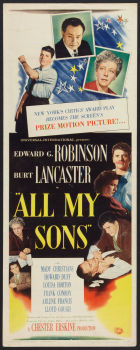
ALL MY SONS
US, 1948, 94 minutes, Black and white.
Edward G. Robinson, Burt Lancaster, Mady Christians, Howard Duff.
Directed by Irving Reis.
All My Sons is an effective screen adaptation of Arthur Miller's celebrated and prize-winning play. Miller wrote the play in the mid-'40s and was to go on to decades on success, especially with Death of a Salesman and The Crucible. The film was adapted by Chester Erskine.
Edward G. Robinson is excellent in the role of the father whose double-dealing during the war is ultimately revealed. Burt Lancaster, in an early role, is also effective as his idealistic son.
The film keeps close to the play, is a piece of Americana focusing on World War Two, military involvement, the work of those in industry at home - and the unscrupulous fulfilling of the American Dream by making money at the expense of faulty equipment and the deaths of American soldiers. The film was directed by Irving Reis.
1. A celebrated play by Arthur Miller? A piece of America of the '40s? The adaptation from the stage to the screen? How successful?
2. Production and style, black and white photography, the re-creation of American suburbia in the '40s? Prison? The musical score?
3. America in the '40s, the experience of the war, men and women giving their life in the military services, industry and its service to the war effort? Human sacrifice, the American Dream and greed? Lies?
4. The title: references to Chris and Larry, to George, to all the men who dies through Joe's fault?
5. Edward G. Robinson as Joe: cheerful presence, the ordinary citizen, his love for Kate and his consideration, his pride in his sons, love for Chris, building up the factory for him? The tension about Larry's death? Ann's return, the friendship of the neighbours and their visit? His pride in his family? The gradual revelation about his work, the factory, the Herb Deever as his partner? The talk about jail? Blame? His cheerfulness, taking Ann and the family out, the drunk woman in the restaurant and the scene? George's arrival and his anger? The smooth talk, changing George's mind and his staying to dinner? Joe and his boasting about never being sick - and the slip about the truth and his double-dealing? Chris, his alarm, his return home after the visit to the jail, the clash and the blame? Kate and her protecting her husband? Ann and Larry's suicide letter? The effect on Joe - his being so smart, the reasons for what he did, the rationalisations? The realisation of what had happened? His killing himself?
6. Kate, nervy, expecting Larry to return, wary about Ann's visit, her playing the piano? The engagement, not wanting Chris and Ann to marry? Knowing the truth, protecting Joe, taking responsibility? Her welcoming George into the house, the letter from Ann, the truth?
7. Chris and his earnestness, his war experience, falling in love with Ann, Larry's death? Ann's arrival, the bond between them, the proposal? His faith in his father? Suspicions about Herb? Ann and George, George's arrival, the dinner, the doubts at the meal? Asking his father the truth? Going to visit Herb in jail, hearing his version, his disillusionment? Ann and the letter from Larry? Confronting his father, the speech about realising what had happened, taking responsibility? His future with Ann?
8. Ann, her relationship with the family, Larry's fiancee, in Chicago, at home with the family, friendly with the neighbours, the outing to the restaurant, George's arrival, forbidding the marriage, the meal, the truth? Her return, staying with the neighbour? The letter from Larry? The reconciliation, a future with Chris?
9. George, lawyer, against his father, listening to his father, the hostility at his arrival, Kate breaking it down, the meal, his realisation of Joe's slip?
10. Deever and his reputation, his telling the story, the flashbacks, the faulty cylinders, Joe's stance, the sick day, taking responsibility over the phone, this not holding up in court? His past irresponsibility, the court condemning him? The effect of the years in prison? The rejection by his children? Chris's visit?
11. Frank and Lydia, neighbours, Frank's bluntness, Lydia's friendship? The friendship with George? Jim and Susan, bluntness, support, realisation of the truth?
12. Larry's presence, the memories, engagement to Ann, his parents wanting him to return, Chris's pride? The letter, his being ashamed of the headlines about his father, his killing himself? The sacrifice on behalf of others? The 21 men who died in the planes which crashed because of the faulty cylinders?
13. America, family, the dark side? Confrontation of the truth? Dramatic conflicts in families? Resolution, tragedy, hope?